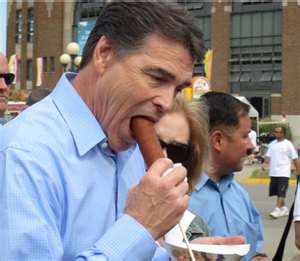Though we finally have an official end date for the reign of Rick Perry, it will be years before we fully purge him from our system.
The strong lieutenant governor legend gelled during Bill Hobby’s tenure from 1973 to 1991. He was a parliamentarian before he was lieutenant governor, the son of a governor and a United States cabinet secretary. His successor was Bob Bullock, who held the office for eight years but who built a power base in Texas government during 16 years as comptroller of public accounts.
Perry followed Bullock’s model, mentoring young lawyers and policy wonks and political animals and then posting them in agencies throughout the state government. After six years of Perry being in the governor’s office, virtually every appointee had him to thank for their post. And over his first decade in office, the governor seeded the executive branch with his former aides and their like-minded peers. They’re all over the place, with titles like executive director, general counsel, communications director and so on.
He owns it. Bullock did something similar by heading a big agency that eventually sprinkled former employees all over state government. Bullock people were everywhere. He had a long reach and an impressive intelligence network.
And Perry picked up the lesson, turning what was designed as a weak office into a strong one.
He has made it look better than it is.
His successor has to start all over. Perry’s transformation of the office might be permanent. The agencies might naturally turn their ears to a governor for guidance after all these years out of habit.
It will take six years to replace all the appointees who owe their jobs to Perry, a third of the jobs turning over every two years. The people at the tops of all of those agency organization charts will linger until retirement — Perry’s legacy —and while they may be helpful to a new governor, they will not be indebted like they are to the old boss.
While no one currently owes any allegiance to Greg Abbott, it’s unlikely that he’ll have too much trouble from anyone. They don’t need to love him, or to owe him, they’ll work for him because Abbott isn’t going to do anything much different than Perry had been doing. The interesting question to ponder is what happens in the event of, say, a Governor Davis in 2015 or a Governor Castro in 2019. How much can the Perry people, or the Perry and Abbott people do to impede a future Democratic Governor? In the old days one would have expected even a political appointee to be a professional first and foremost. To be fair, some of Perry’s appointees have been pros – while none of them would be on my short lists and all of them have done things I disagree with, I’d say Tom Pauken, Tom Suehs, Robert Scott, and Michael Williams have met my expectations for professionalism. But it’s not just them, it’s the people who work for them, who will be there well after Perry’s successors get to pick their agency heads. Who knows what kind of mischief they could cause if they had a mind to do so. Maybe I’m worrying about nothing here, but we’ve never had a governor like Rick Perry before. I don’t think it’s unusual to wonder about how life after Rick Perry will be.


Pingback: Eye on Williamson » Electing Democrats is the best revenge